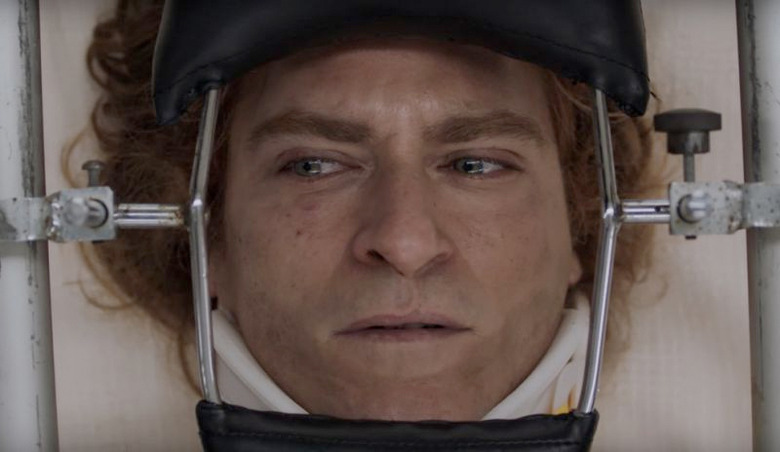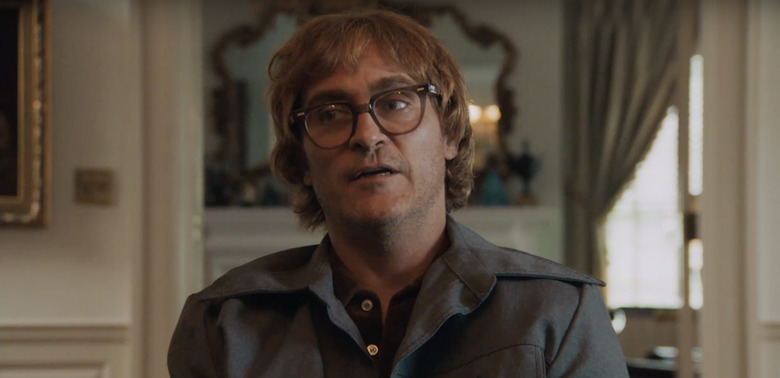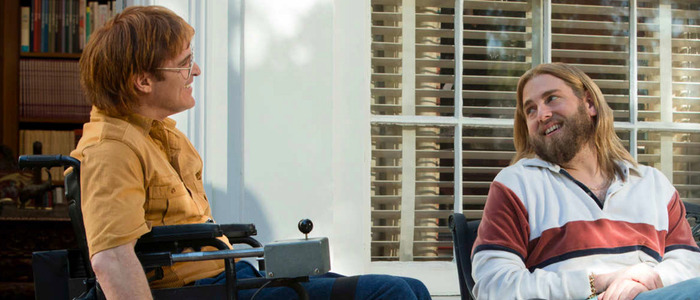How 'Don't Worry, He Won't Get Far On Foot' Eschews The Traditional Trappings Of The Biopic
Don't Worry, He Won't Get Far on Foot, the new film from Gus Van Sant (Good Will Hunting), finds strength in a discombobulated narrative. The tale of late quadriplegic cartoonist John Callahan, a mean-spirited alcoholic on the road to being better, Van Sant's biopic hits every beat expected of a based-on-a-true-story story — the tragedies, the triumphs, the moments of realization, even the lofty speeches that tie them together — only it organizes them in a manner that flies in the face of traditional Hollywood storytelling. The film isn't some mystery to be unlocked though; it's a presentation of the familiar robbed of its starry-eyed quality, with a sharp focus on the real-world nuances, and difficulties, of self-actualization. It's "like real life" in a way movies aren't usually meant to be, ignoring narrative instincts, often intentionally, in favour of achingly human real-world complications, the kind that cinema and television are rarely adept at capturing.
The film, like the book it's based on, takes its title from a self-deprecating cartoon by Callahan, an "equal opportunity offender" who began drawing in lines and squiggles after his accident, and who reveled in offending the guardians of "Political Correctness." Joaquin Phoenix plays Callahan with a similarly self-deprecating streak, introducing himself at every party and AA meeting with the same bitter mantra that articulates his core as a character: "I knew three things about my mother. She was Irish, she had red hair, and she was a school teacher. Oh yeah, and she didn't want me. I guess that makes four things."
Callahan’s Chaotic Tale
A drunk driving incident during which he was riding shotgun (though during which he was no less inebriated) leaves Callahan with limited physical mobility. And while a significant portion of the film is dedicated to his physical therapy, his disability is treated more as a matter of fact than a demon to be overcome; his wheelchair is more freedom than confine, as is the case for many disabled folks who rightly take issue with the idea that one can be "confined" to a mode of transport. Callahan's real demon is his alcoholism, at least at first. It's certainly the shape his demons take; he's cocooned in the kind of deeply rooted self-loathing that he must shed over time, lest it consume him.
The story begins by moving between close ups of strangers without orienting us in time. We're somewhere in the middle of Callahan's life. Or perhaps somewhere towards its end (it isn't clear), at one of a myriad of private gatherings for recovering alcoholics led by Donnie (Jonah Hill), a gay socialite clinging to a hippie aesthetic, though more for the sake of spiritual guidance than an easy-going lifestyle. It's from these various meetings that Callahan narrates the events of his past — sometimes from his comfortable dozenth gathering, sometimes from his tumultuous first — though his narrations are also occasionally drawn from the stage of an acceptance speech where he's being awarded for cartooning. The film's structure is chaotic, but never haphazard. Chaos, as Donnie explains, is a though line in the lives of all these addicts (Mark Webber's Mike, Udo Kier's Hans, Beth Ditto's Reba, Kim Gordon's Corky, and so on), a group from far-flung corners of American experience whose tensions Donnie must mediate.
Upon Callahan's initiation to the group, he chastises its members for being unable to understand his pain, though it turns out every member present has, at some point, used their circumstance as buttress for addiction. Some have used their cancer, some their PTSD, some their oppression within society, and so on. Callahan's story may be unique, but it isn't new. In fact, it's posited as a tale so universal that it's merely a remixing of specifics, with the same themes and narrative beats seen elsewhere. Everyone in the room has a story to tell. Callahan's just happens to be our window into the nature of realizing one's ingrained, and learned, hostilities.
When Callahan could still walk, he began the day of the accident by stumbling out of bed, still drunk from the night before. As his high wore off, the shakes began to set in, and so too the aggression, the self-hatred and the irritability that come with a painful sobriety, sending him straight to the nearby liquor store — a portrait of addiction that understands its specifics. By the end of the night, his poor decisions had led him to hop in a car with an equally intoxicated stranger, serial partyer Dexter (Jack Black), who walks away from a devastating accident without a scratch. Callahan doesn't walk away at all. Instead, he spends countless months unable to move a muscle, wishing he could be put out of his mistery. He's visited frequently by kindly Swedish physical therapist Annu (Rooney Mara with short blond hair and a bubbly disposition), with whom he eventually falls in love. Annu is the kind of character who, in any other film, would be the protagonist's manic pixie salvation, though her positioning as such feels distinctly subversive.
Non-Linear by Necessity
Barring Annu's initial insistence that Callahan could still live a life worth living, a motivational gesture during his recovery, Annu's romantic entanglement with Callahan serves no such purpose in the long run. They don't get involved until years later, even though the narrative structure places Annu's scenes in close proximity to ones where Callahan has moments of self-realization. Their romance is on equal terms, and Callahan's self-actualization comes independently of any individual person.
Thanks to the film's topsy-turvy chronology, Callahan's issues are never neatly laid out as a matter of cause-and-effect, at least in the way they're dramatized. Callahan certainly attempts to rationalize them as such. They have, over time, become a jumble of thoughts and feelings, from his addiction, to his maternal abandonment, to his general misanthropy in the form of callous cartooning. They're each facet of Callahan himself, externalized at (in)opportune moments; he often lashes out at those attempting to help him, as he blames their inability to relate to his woes. His individual problems have become inexorable from one another because they've become fundamental to Callahan's very identity. Chaos, in Don't Worry, is both a universal force as well as an internal status quo, once that can't simply be wished away in a singular moment of hopefulness.
There's a particularly powerful scene in the film, after his search for his mother hits a wall (and thus, his search for closure), when Callahan imagines her hand on his shoulder, shown to us through a hand-print pressing against his shirt. This ethereal occurrence, as if some sign from the universe itself, helps him find the strength to stop drinking. Though even this decision isn't so much a full-stop as it is an ellipsis... The moment itself, and its effects, are soon discarded. While its cinematic language rings true, the narrative goes back on it regardless, as if cheating us out of the kind of easily digestible catharsis we often desire from cinema. The only moment of realization that truly lasts is Callahan expressing, to Donnie and the others in the group, that these moments aren't like they are in the movies; a vocalization that ought to feel tongue-in-cheek, but is painted with glowing sincerity.
For most people, and for most problems, there is no "the moment," at least not one that finds us. Callahan's accident doesn't miraculously make him any less of an addict — he's been drinking since was thirteen. If the moment exists, it must be sought. For most, there is no singular, life-changing instant that sets one on a linear path to salvation. For a man as spiritually broken as Callahan, the future holds an untold amount of wrestling with personal demons, the ceasing of which, as Donnie reminds him, could lead to relapse and eventually death.
Forgiving others, forgiving himself, and forgiving the hand he's been dealt are a only handful of steps; not twelve, but infinite steps. An infinite road that lies in front of Callahan on his road to slowly being better to himself and to those around him. He meets with everyone he ever wronged, even in minor ways. Like Carrie Brownstein's harsh, frustrated social worker to whom he was rude, and he even tracks down Dexter, the man responsible for his accident, whose own life takes a turn that leaves him in need of Callahan's newfound approach of kindness. None of these encounters change his life, at least not permanently. But they do help him cope.
The Film’s Performances
Jack Black begins the movie as a distinctly "Jack Black-esque" obnoxious oaf, though in seldom commended Jack Black fashion, his second appearance in the film (years after the accident) peels back the layers of humanity beneath this façade as Dexter reconciles, both with Callahan and with himself. It's an expert bit of casting, aimed squarely at recognizing the pain hiding even with those who may not deserve it. Just as precise is the presence of Joaquin Phoenix as a man biting at his own soul, searching desperately for ways to escape a spiritual hell he may have created for himself, in a performance that rivals his work in Gladiator, The Master and You Were Never Really Here.
There is, of course, the question perpetually worth asking: in terms of opportunity, could this character have been played by a disabled actor? Perhaps. Scenes of Callahan before his accident are certainly a built-in excuse to cast someone able bodied, but regardless of the debatable real-world ethics, Phoenix delivers a tremendously pained performance, as a man whose physical limitation is merely one of a mountain of reasons for his stunted emotions, and that too only until he finds new freedom in his electric wheelchair. The wind blows through his mop of red hair as he charges down the street, finding moments of triumph that are unconnected to his larger journey, though perhaps their mere presence in otherwise gloomy days is connection enough. Phoenix responds, with confusion and frustration, to the circumstances around him and his inability to improve them, as if responding to the narrative structure itself. The story beats thrown his way ought to make things easier; the setups ought to have clearly defined payoffs. That they don't sends Phoenix searching, as if exploring the depths of Callahan's very soul, attempting to find answers that refuse to reveal themselves.
The film's secret weapon, however, is Jonah Hill's Donnie. If there were ever a doubt as to the comedian's skill as a quiet dramatist, Donnie spends the length of the film in a withheld state that feels like it could shatter at any moment. He carries a painful past beneath his eyes, though one we aren't made privy to. In his every scene, you can feel him struggling to turn his pain into something positive, steering a vessel that could go off course at any minute, away from a familiar iceberg and towards the rescue of others. But Donnie, like Annu, serves a subversive purpose.
Donnie is introduced to Callahan whilst speaking from a pedestal and backed by Christian symbols. His hair and beard are reminiscent of western depictions of Christ. But like Annu, rather than an external saviour Donnie is only an external facilitator of Callahan's internal salvation, the kind that has no defined end-point. His relationship with Callahan is contentious, and it never ceases to be, but Donnie's love for Callahan regardless makes him all the more Christ-like. Helping Callahan is Donnie's own path to salvation; a means to helping himself by repairing his fractured soul. Every scene shared by Phoenix and Hill feels like it ought to lead to a profound realization about the universe itself. That it only leads to them a small step closer to understanding each other is, perhaps, profound in its own unassuming way.
The Long Road to Recovery
Donnie's spiritual advice is a means to help himself as much as a means to a help others, a constant reminder of the battles he himself fights every single day. The structures of religion and spirituality, even those that exist to save us from ourselves, are ultimately human constructs. It's still us that needs to do the saving.
Rather than a linear tale with defined Acts, broken up by decisions that feel final or from which the characters can't return, Don't Worry, He Won't Get Far on Foot presents its story in the form of repeating cycles. A spiral staircase that feels repetitive in its climbing, by design. Circumstances are most often outside the characters' control, and are usually so vast that they can't be dealt with in the form of a singular action, or a singular shift in mindset. They are, instead, gigantic blocks of stone that require a delicate chisel, and the dedication to sculpt one's life back into a manageable shape, bit by bit, over decades.
In presenting problems and solutions in this cyclical manner, Van Sant and his cast craft a touching film that cuts straight to the heart of human experiences that are seldom canonized in fiction: the kind with no endings. Only those that begin, and those that we continue to wrestle with in the hopes of getting by.
***
Don't Worry, He Won't Get Far on Foot is in theaters today. You can read our review from the Sundance Film Festival here.



